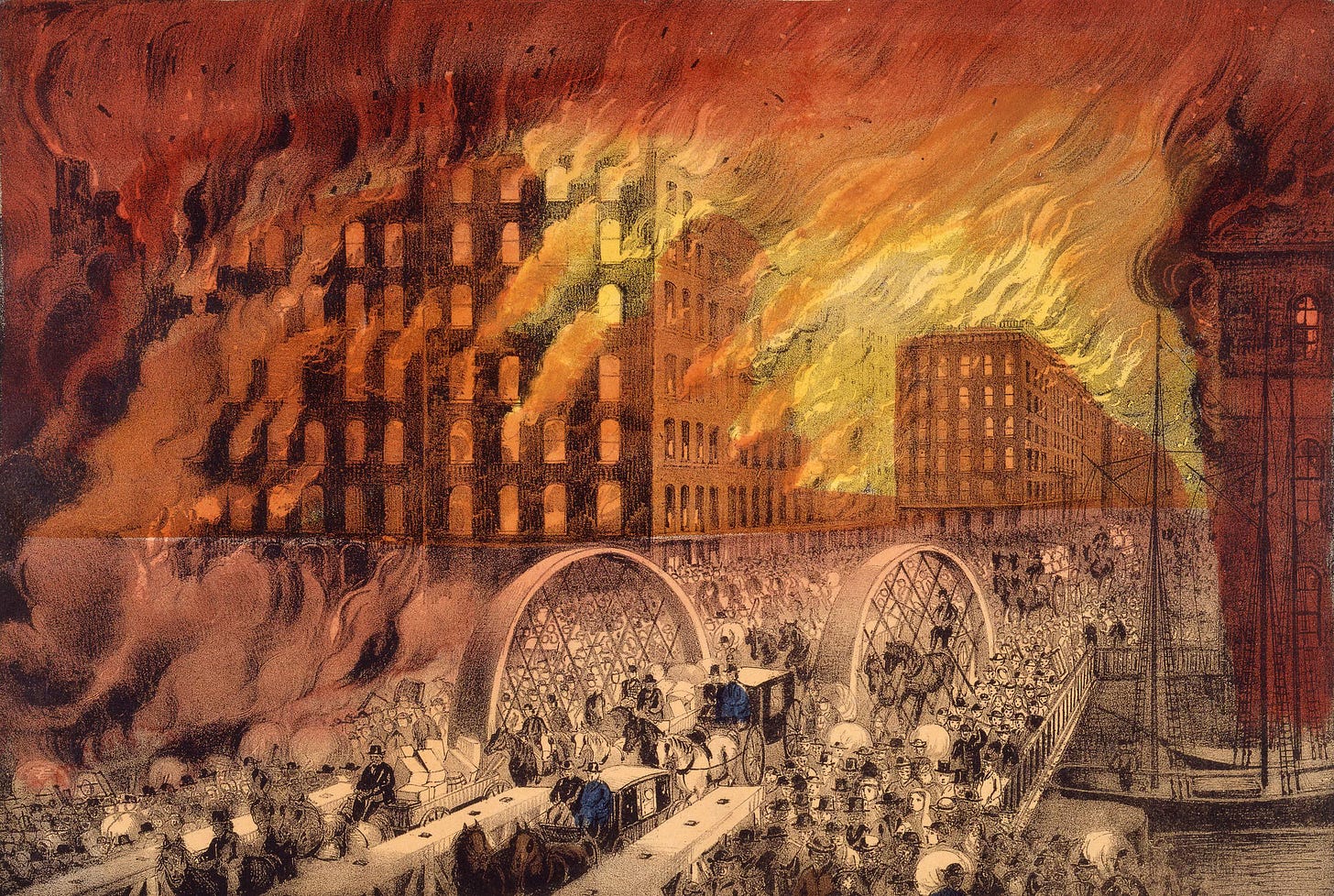This Day in Legal History: Martial Law Post-Great Chicago Fire
On October 9, 1871, in the immediate aftermath of the Great Chicago Fire, the city’s mayor, Roswell B. Mason, declared a form of martial law by handing control of the city to U.S. Army General Philip Sheridan. Though no formal martial law order was issued, Sheridan exercised sweeping authority over Chicago, including the deployment of troops and armed patrols to maintain order, protect property, and enforce curfews. The fire had devastated the city, destroying thousands of buildings and leaving over 100,000 residents homeless. Amid fears of looting and social collapse, civic leaders turned to the military rather than civil institutions to reestablish control.
This decision represents a critical episode in the uneasy balance between civil liberties and emergency powers. There was no legal precedent or formal legislative act granting the mayor authority to transfer governance to a military figure, raising significant constitutional concerns. The use of military force to police civilians, absent explicit legal authorization, blurred lines between civilian and military jurisdiction. While contemporary accounts often depict Sheridan’s leadership as effective, his presence underscored a mistrust in the city’s own law enforcement and judicial institutions.
No court review or legislative inquiry ever addressed the legality of this transfer of power, setting a troubling precedent for extrajudicial emergency actions. It also reinforced the broader 19th-century trend of informal martial law declarations, especially during moments of urban unrest or disaster. Chicago’s experience in 1871 reflects how crises can be used to justify the suspension of normal legal processes, often without public accountability. This ad hoc militarization of city governance, though temporary, highlighted the fragility of civil authority in moments of panic—and how quickly constitutional norms can be cast aside.
Former FBI Director James Comey pleaded not guilty to charges of making false statements and obstructing a congressional investigation. The indictment alleges he misled lawmakers in 2020 about authorizing an FBI employee to leak information related to an unspecified investigation—believed to concern Hillary Clinton. The case was brought by Lindsey Halligan, a Trump loyalist with no prior prosecutorial experience, recently installed as U.S. attorney after her predecessor was removed for refusing to pursue Trump’s political adversaries.
The charges are seen as politically motivated, coming after Trump publicly pressured the Justice Department to act against Comey and others. Career attorneys reportedly opposed the indictment due to a lack of evidence, and prosecutors from outside the district were brought in to proceed with the case. The move has drawn sharp criticism, including from over 1,000 former DOJ officials across party lines who labeled it an attack on the rule of law.
Trump has long threatened to imprison rivals, but this is the first grand jury indictment against one of them.
Ex-FBI chief Comey pleads not guilty to charges brought under pressure from Trump | Reuters
A Florida man has been arrested for allegedly setting the Pacific Palisades Fire in Los Angeles, a January blaze that killed 12 people, destroyed roughly 6,000 structures, and caused an estimated $150 billion in damage. Federal investigators from the ATF, LAPD, and LAFD concluded the fire was deliberately started near a hiking trail in a state park overlooking the Palisades. The suspect faces three federal charges and will be extradited to California. Because the fire was ruled intentional and led to multiple deaths, prosecutors could pursue life imprisonment or the federal death penalty under President Trump’s 2025 executive order directing harsher penalties for severe crimes.
Man arrested as suspect in setting California’s deadly Palisades Fire, official says | Reuters
President Trump called for the arrest of Chicago Mayor Brandon Johnson and Illinois Governor J.B. Pritzker, both Democrats, as his administration prepared to deploy National Guard troops to Chicago over their opposition. Neither official faces criminal allegations, but both have criticized Trump’s immigration policies and his use of federal troops in Democratic-led cities. Trump accused them of failing to protect ICE officers after Johnson declared Chicago an “ICE Free Zone.” Pritzker denounced Trump’s remarks as authoritarian. Meanwhile, hundreds of Texas National Guard troops have gathered outside Chicago ahead of deployment, despite state lawsuits seeking to block the move. The president has also threatened to invoke federal powers to override court orders limiting troop deployments, part of a broader pattern of using federal authority against political opponents.
Trump calls for jailing Democratic leaders as troops prepare for Chicago deployment | Reuters
Elon Musk’s X Corp has reached a settlement with four former Twitter executives—including ex-CEO Parag Agrawal—who claimed they were owed $128 million in severance after being fired following Musk’s 2022 takeover. The settlement’s terms were not disclosed, but a federal judge delayed case deadlines to allow finalization. The executives alleged Musk falsely accused them of misconduct to avoid paying severance that included a year’s salary and stock options. The deal follows a separate $500 million settlement with laid-off Twitter employees and is one of several legal disputes stemming from Musk’s acquisition and mass restructuring of the company.
Musk’s X settles ex-Twitter executives’ $128 million severance pay lawsuit | Reuters













